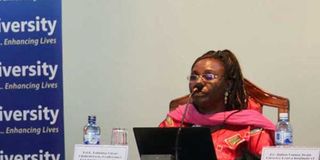CS Magoha picks team to oversee rollout of new education system

Prof Fatuma Chege who will lead the team picked by the Education minister to oversee the implementation of the country’s new education system. PHOTO | FILE | NATION MEDIA GROUP
What you need to know:
- The team will explore ways of enhancing access, relevance, equity and quality for effective implementation of the new curriculum.
- It will undertake a broad stakeholder engagement and identify international best practices with a view of preparing the country for the transition to the new education system.
Education Cabinet Secretary George Magoha has formed a 26-member taskforce to drive the transition from 8-4-4 to 2-6-3-3 education system.
The team will be led by Prof Fatuma Chege who is Kenyatta University's deputy vice-chancellor in charge of administration Fatuma Chege.
The taskforce will explore ways of enhancing access, relevance, equity and quality for effective implementation of the new curriculum.
NEW SYSTEM
In a notice published in the Kenya Gazette, Prof Magoha asked the taskforce to undertake a broad stakeholder engagement and identify international best practices with a view of preparing the country for the transition to the new education system.
Under the new system, elementary education is divided into two; pre-primary and primary education, taking two and six years respectively.
Pupils will then advance to a three-year junior secondary school before joining the senior secondary level for another three years where they will focus on their areas of specialisation depending on their abilities and interests.
After the senior secondary stage, students will either enroll at vocational training centres or pursue university education.
There has been debate on the fate of junior secondary education with raging debate on whether it will be anchored in primary or secondary schools in the ongoing implementation of the new curriculum.
But in the gazette notice, Prof Magoha seemed to suggest that the government is keen to have junior secondary education managed under the basic education regime.
Consequently, one of the terms of the reference for the task force will be to explore ways in which Grade 7, 8, and 9; which constitute Junior secondary under the new system, will fit in the basic education structure.
Besides the question of junior secondary, the task force will have to conduct an assessment for the new curriculum, identify schools to host the pathways and tracks in senior secondary education, while considering equity and cost effectiveness.
It will also develop strategies and work plans to prepare the country for the implementation of senior secondary pathways and tracks in 2026, including infrastructural and human resource requirements; conceptualise and design competency based pre service teacher education.
“The task force will design and implementation of values-based education, community service learning; and parental empowerment and engagement programmes,” the CS said the notice.
The task force will also look into the transition from basic to tertiary and training in 2029 including infrastructural and human resource requirements.
The CS has given the task force one year to come with a report in which it will also be provide advise on the legal issues necessary for effective implementation of the curriculum reforms, including framework on the working relationships between the national and county governments on the implementation of pre primary curricular.
It will also prepare a strategy for monitoring and evaluation of the curriculum reforms implementation, advise on other relevant issues for effective and efficient implementation of the curriculum reforms implementation.




